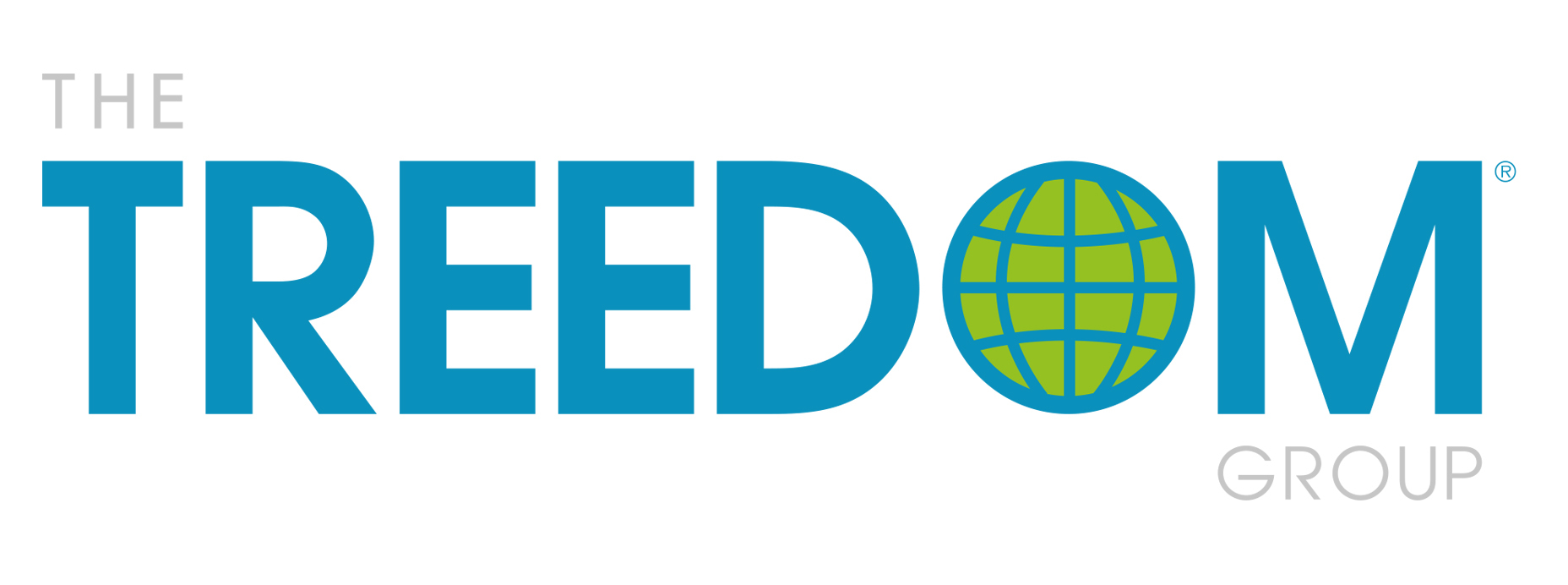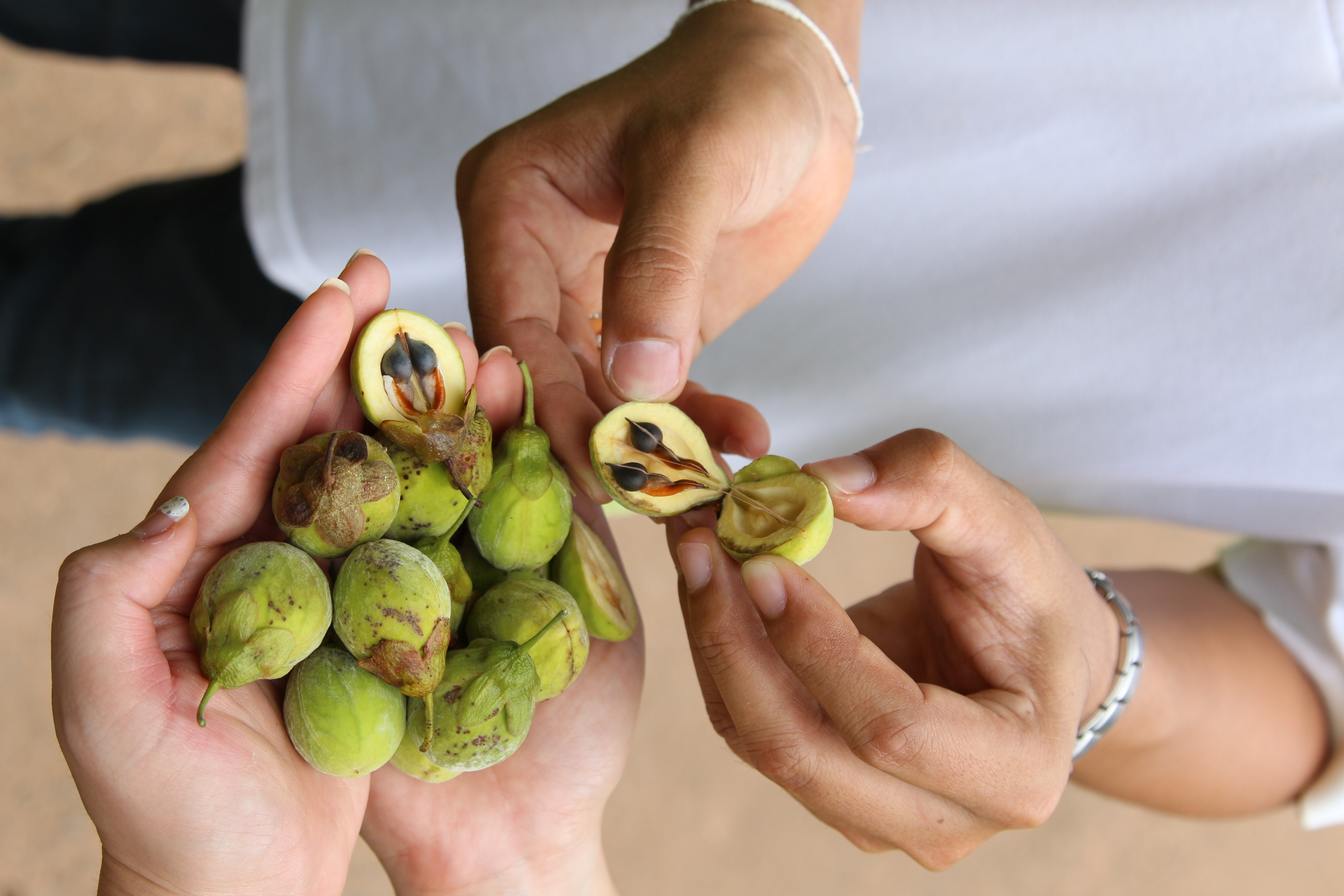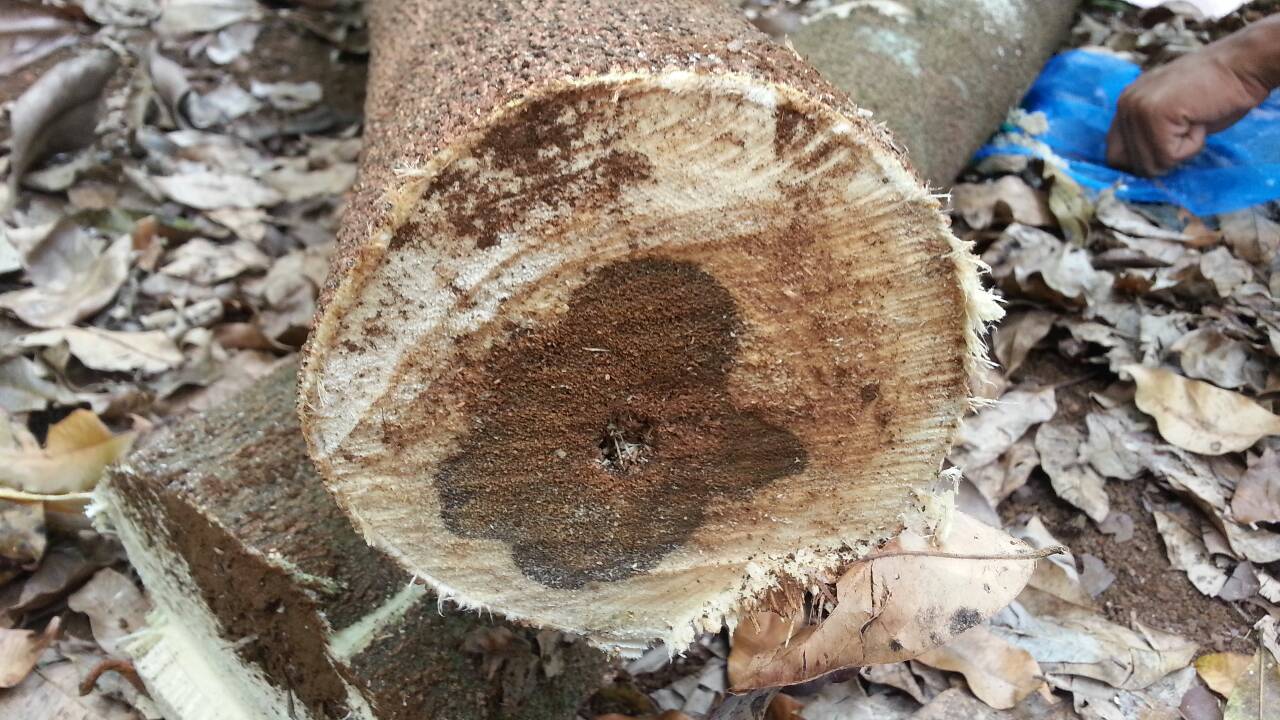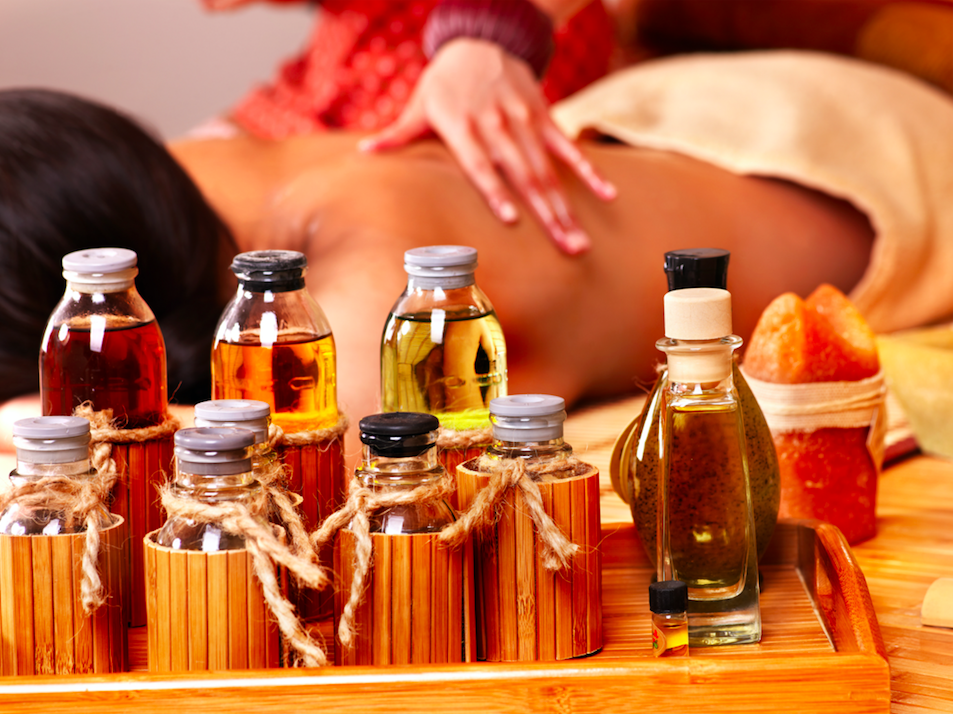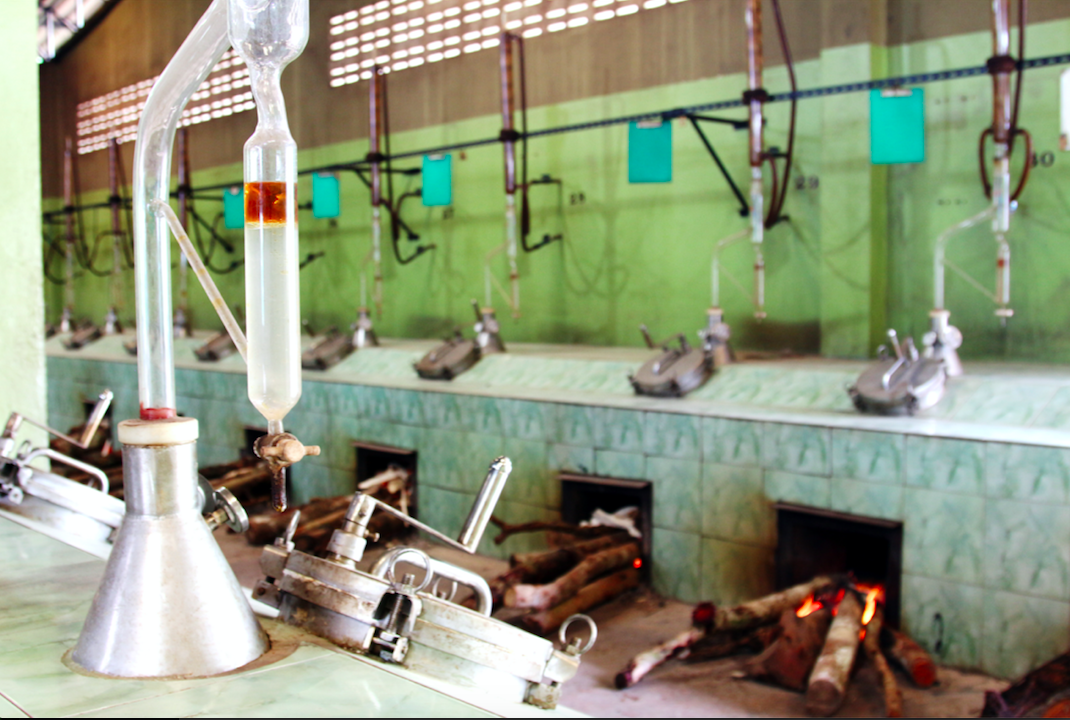Oud oil comes from trees and wood of the genus Aquilaria, fifteen species of trees that are native to Southeast Asia. Trees of this genus are often referred to as Agar, Agarwood, Aloeswood or Eaglewood. Oud oil extracted from the Agarwood tree has only recently become well known in the West when major perfumers started to use it as a base oil in their fragrances.
However, Oud oil and Agarwood have a deep and meaningful history going back long before our modern-day usage of the product. The Prophet Mohammed was said to scent his home with Oud. Oud/Agarwood is also mentioned by the 9th-century Islamic scholar al-Bukhari as one of the plants of Paradise. The Tanakh (Old Testament) refers to ‘aloes’ at least 5 times, but the ‘aloes’ mentioned in the Bible are not Aloe Vera, they are actually Oud.
In the Photo: Black resin in the Agarwood. Photo Credit: The Treedom Group
From Damage Comes Healing
Interestingly, the healing properties of agarwood derive from a fungus or mold infection of the aquilaria tree. Without this attack, the trees are virtually worthless but once invaded they produce a rich resin as a defense mechanism in the heartwood of the tree. This dense resinous wood which is dark brown is transformed into an incredibly valued and valuable commodity: oud.
In nature, only a small percentage of wild trees are infected, and only a percentage of those sufficiently so to produce the resin. However, demand can be met with the growth of trees in the plantation sector.
Related Article: “HEALTH IN THE SUSTAINABLE DEVELOPMENT GOALS“
The global Oud market is currently estimated at USD $2 Billion dollars. Continued support and development of the infrastructure in this industry can contribute to the elimination of poverty as well as have a significant effect on other sustainable development goals.
In my opinion, this potent and seemingly unknown and cherished product has the ability to contribute to the Sustainable Development Goals in a way that hasn’t been discussed before. It has been a hidden gem that deserves recognition outside of the areas where it is currently well known and sought after.
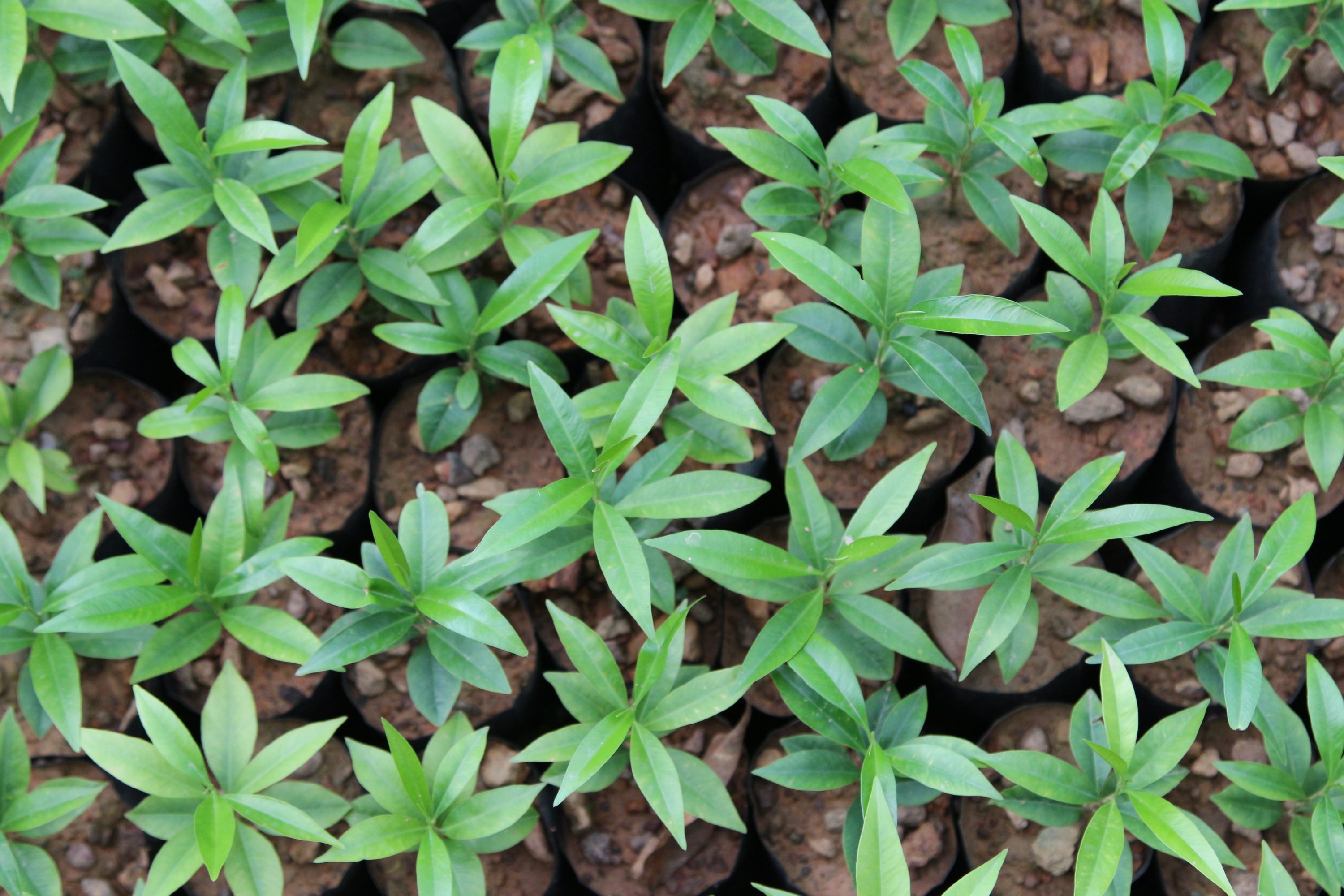
In the Photo: Agarwood saplings in the nursery. Photo Credit: The Treedom Group
How is Treedom helping?
The Treedom Group has been working with local communities in Thailand to develop this industry for over a decade. It was identified at a very early stage that a significant number of trees had been planted in the region with the anticipation of ‘natural’ infection occurring. The farmers did not possess the ability to ‘artificially’ induce the infection in the tree or extract the value due to lack of processing facilities and the high costs of the ‘artificial’ inoculant.
Treedom has been able to provide a solution on both counts by paying a fair market value for the tree, inoculating the tree, which otherwise would have been sold as firewood, and then harvesting it for the precious Oud oil. This allows for the farmer to re-grow the tree with minimal cost and resell it in the future, thus preventing land conversion to cash crops.
Agarwood in Traditional Chinese Medicine
For thousands of years, agarwood, known as chen xiang (沉香) and Oud Oil have been used in Traditional Chinese Medicine (TCM). As well as TCM, agarwood is valued by many alternative medicinal practitioners in Ayurveda, Tibetan and Arabic medicine. The sheer number of physical and mental ailments that are treated with the use of agarwood resin and oud oil is impressive.
So deeply ingrained is agarwood as a potent, almost magical ingredient into the psyche of traditional Chinese culture, that it is believed that Samurais would use the perfume on their armor to bring good luck before going to battle.
Oud oil is used in TCM as a tonic, stimulant, and even an aphrodisiac. Many abdominal conditions are treated including indigestion problems and even stomach tumors. Agarwood is used as an anti-asthma medicine and pleurisy antidote as well as being valued as a pain and stress reliever along with an aid in treating neuromuscular conditions. As a tonic, agarwood is used to address blood impurities and has been used to tackle hepatitis and anemia too.
Much research has looked into the antibacterial properties of agarwood and how it could help target Mycobacterium tuberculosis, for example. Whilst on a psychological level, the oil extracted from agarwood is believed to be a rescue remedy that can influence brainwaves with a soothing, harmonizing effect.
In the Photo: Agarwood oil in spa industry Photo Credit: The Treedom Fund/Purchased from Shuttershock
The Chinese Market
Within China, Oud Oil as a fragrance is attracting attention and agarwood, which is some 35 times more expensive than gold per gram, is fast-becoming an investment for the luxury Chinese market. Wood shavings and particularly wood powder as well as the oil are used in TCM and this is extending into more modern Chinese pharmacopeia.
As a luxury item, high-profile attention has promoted the fragrance and agarwood too. Well-known Chinese TV host Wang Yinan who is the director of the National Chen Xiang Research Association has pushed agarwood into the limelight and under the noses of China’s elite and they are certainly following the heady scent.
Wealthy Generation Y buyers who value experiences rather than merely accruing assets are proving to be a good customer pool to target. Especially because within Chinese culture there is an ingrained understanding of natural ingredients and the healing effects they have that parallel those of modern medicine. Add to this a progressive acceptance into mainstream medicine of TCM and China is set to become an agarwood capital, not only within Southeast Asia, but globally.
Oud Oil’s Anticancer Properties
Could oud oil also offer a pioneering treatment in the fight against cancer? A recent study suggests that oud oil possesses anticancer activity toward MCF-7 breast cancer cells. These latest findings from a Malaysian research university study back up the use of agarwood essential oil as a treatment for inflammatory-related diseases. The study revealed that oud oil concentration of 44 μg/ml was able to inhibit 50% of control cell growth. The results could mark further investigation into the medicinal capabilities of oud oil as an alternative cancer treatment.
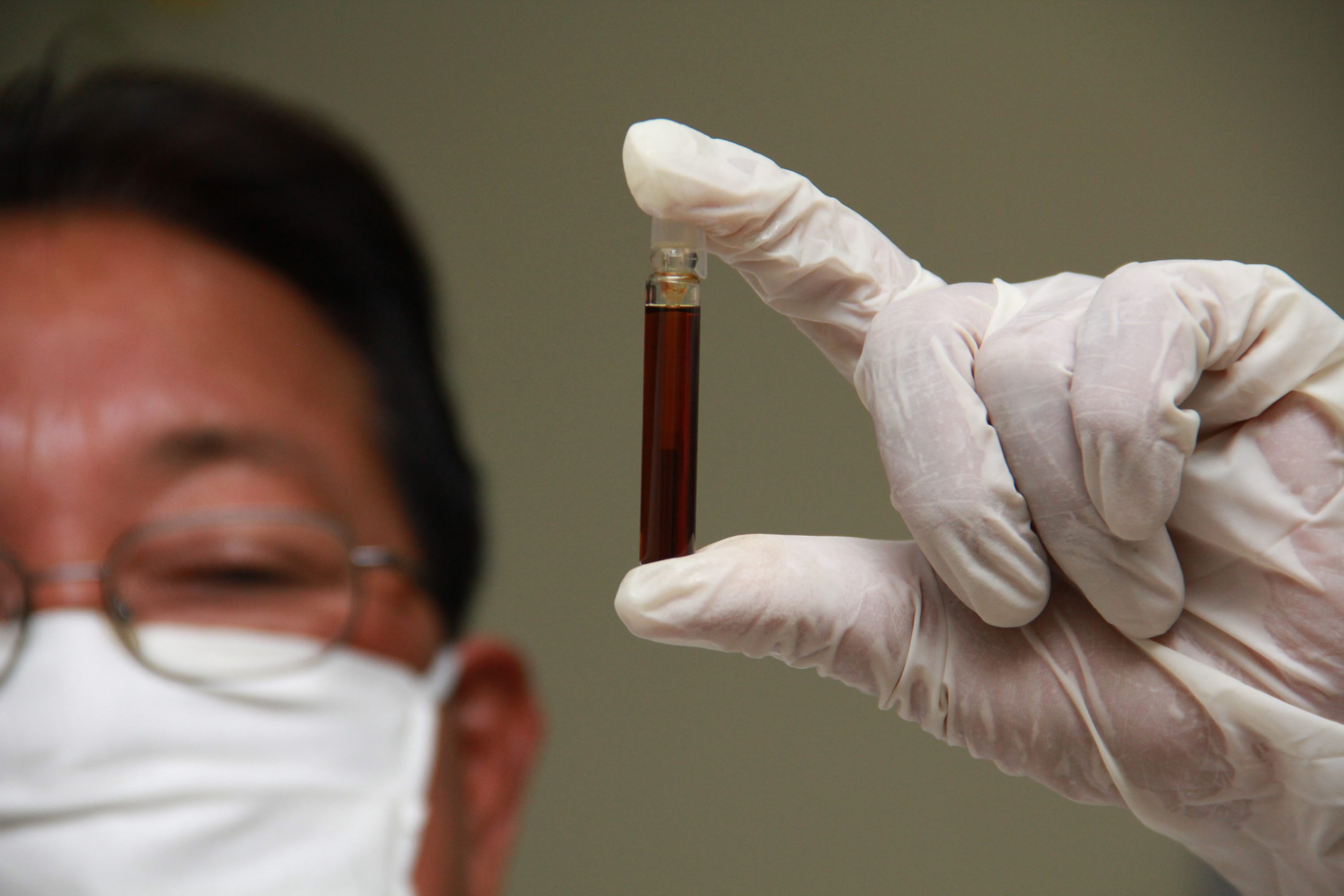
In the Photo: Extracted agarwood oil (oud oil) Photo Credit: The Treedom Group
Anti-pancreatic cancer properties
A separate study in Malaysia also found agarwood essential oils to have anti-pancreatic properties. The inhibition of metastasis and induction of apoptosis in the pancreatic cell line was investigated. The results revealed that the oils used exhibited potent cytotoxic activity against these cells, inhibited cell migration and at a certain dosage could significantly obstruct the colony formation properties of the cell line.
Oud oil compound properties
The unique compounds found in oud oil in high concentrations are believed to be the key to its wide use to treat a great number of health and wellness issues. Carvacrol, trepans, and phenols attack viruses and bacteria within the body and the oil has an anti-microbial property which researchers have looked into as a possible treatment source for illnesses such as MRSA and staph. The oil has an anti-oxidant and anesthetic effect too. The potential that oud oil could act as a cell-killing agent to cancer could lead to powerful medical breakthroughs.
Time for Agarwood Tea
Agarwood tea is an elixir of wellness that inspires well-being. Every element of Agarwood and Oud Oil seems to beckon further investigation and the deep heritage of therapeutic use provides an incredible amount of evidence about many purported health benefits.
Modern lifestyles and pollutants attack the body and mind, creating disease and health problems along the way. Alongside the spectacular advancements of medicine, there has been a growing interest in the power of plants and natural ingredients, many of which, like Agarwood, have been used for thousands of years in complementary health therapies. The antibacterial agents and diuretic properties within the tea cleanse the body, flushing out and eliminating harmful toxins. It is purported that agarwood tea can help get rid of mercury in the body, a poisonous element that is not expelled naturally and which can cause many neurological problems if levels become high.
It is because of the impact on the whole body and the mind, which is so intrinsically linked to physical health, that gives Agarwood tea its special quality as a truly holistic brew.
In the Photo: Agarwood Distillery. Photo Credit: The Treedom Fund
Unraveling the Mystery of Oud
The benefits scripted above are known by only a few. I strongly feel that the message about this fascinating industry needs to be spread. I am a strong believer that many of the diseases in this world can be cured using natural products derived from the forest and oud is showing its wondrous properties albeit being one of the most expensive commodities on the market.
At this juncture, farmers also have to accept the farm gate price if they are physically able to produce the end product although they don’t always have access to market and unscrupulous ‘brokers’ are taking advantage of this fact. Treedom has been able to provide economies of scale that didn’t exist in the industry previously. Therefore, working with communities to cut out the middleman is creating the final link in the value chain that the farmers need.
This mystery surrounding Oud does need a deeper focus to create more marketable products but the product has been around for centuries and it can go a long way to supporting some of the SDGs when the right focus and business acumen are applied.
With the advent of social media, coupled with the smartphone boom, the smaller players in the marketplace are now able to reach out to international customers. The industry would benefit from an international grading standard which could potentially lead to a commodity market being formed and through this, level the playing field. Treedom is working towards creating a standard that can be initially adopted by the Thai standards authority. Later on, the aim is to work in conjunction with other national bodies to create one globally accepted standard for the Oud products.
As the mystery of Oud unravels we can clearly see that it has the ability to generate income for communities which touches on SDG Goal 1 to end poverty. The health benefits of Oud have also been included in numerous scientific journals and are linked to SDG Goal 3 to promote healthy well-being.
Recommended Reading: “TRANSFORMING AGRICULTURE FOR SUSTAINABLE DEVELOPMENT“
As Aquilaria trees are included in the Convention for the International Trade or Endangered Species (CITES) measures are now in place to ensure sustainable consumption, touching upon SDG Goal 12. CITES dictates that the Aquilaria trees can now only be harvested from managed plantations. Therefore, more are being planted which is also combating climate change as trees are effective in removing carbon from the atmosphere.
The mystery surrounding Oud does need a deeper focus to create more marketable products but Oud has been around for centuries and it can go a long way to supporting some of the SDGs when the right focus and business acumen are applied.
